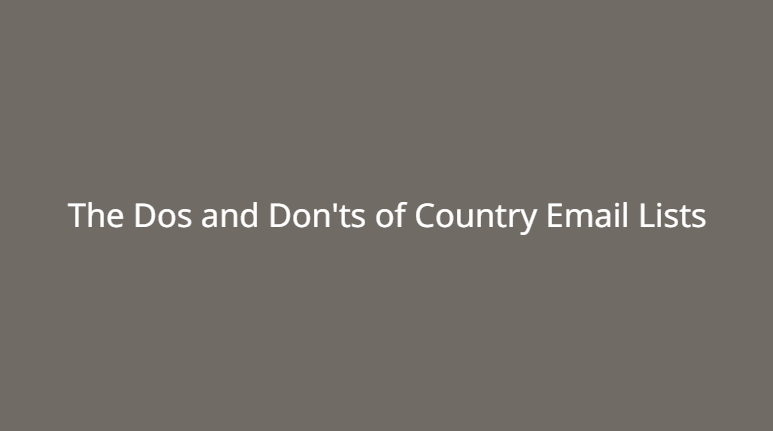The Dos of Using Country Email Lists Effectively
One of the primary dos in working with country email lists is segmentation. By categorizing contacts according to country, language, industry, and customer behavior, marketers can deliver highly relevant campaigns that address the audience’s unique cultural and economic context. Another important practice is compliance with regional laws such as GDPR in the European Union, CASL in Canada, and CAN-SPAM in the United States. Respecting these regulations not only prevents legal trouble but also builds country wise email marketing list trust with your audience. A third key practice is personalization. Addressing recipients by name, referencing their location, and tailoring content to local interests significantly increases the likelihood of engagement. Furthermore, using double opt-in methods ensures that contacts on the list have explicitly consented to receive emails, which improves deliverability and reduces spam complaints. Regularly cleaning and updating the list is another essential step—removing inactive or invalid email addresses keeps your database accurate and improves the performance of your campaigns. Finally, tracking analytics such as open rates, click-through rates, and conversions by country provides valuable insights that can help refine your strategies for each region.

The Don’ts That Can Harm Your Email Marketing Strategy
On the flip side, there are several practices marketers must avoid when using country email lists. First, never purchase low-quality or unverified lists. These often contain outdated, inaccurate, or illegally obtained data, which can result in high bounce rates, spam complaints, and even legal penalties. Second, do not send the same generic message to all countries—what resonates with an audience in Japan may not connect with people in Brazil due to cultural and linguistic differences. Third, avoid overloading recipients with too many emails. Bombarding people’s inboxes not only annoys them but also increases the likelihood that they will unsubscribe or mark your emails as spam. Another major mistake is ignoring local laws—sending marketing emails without considering data protection regulations in the target country can lead to severe consequences, including heavy fines. Also, never disregard unsubscribe requests. Failing to promptly remove people who opt out is both unethical and illegal in many jurisdictions. Lastly, do not neglect testing and proofreading. Sending poorly formatted emails, broken links, or content with cultural inaccuracies can damage your credibility and reduce engagement.
Building Trust and Long-Term Relationships Through Responsible Email Practices
The best way to maximize the value of country email lists is to treat them not just as sales tools, but as a foundation for building long-term relationships with customers. This means prioritizing transparency, respect, and relevance in all communications. Let recipients know why they are receiving your emails and how you obtained their contact information. Offering value in every email—such as helpful tips, localized industry updates, or exclusive offers—encourages recipients to stay subscribed and engaged. Listening to feedback is equally important; if customers express concerns about email frequency or content type, adjust your strategy accordingly. Trust is built over time through consistent, respectful interactions, and once earned, it translates into higher customer loyalty and lifetime value. Also, incorporating A/B testing across different countries allows you to refine your messages for maximum impact without making broad, unfounded assumptions about your audience. By combining ethical practices with a genuine interest in customer needs, businesses can turn their email marketing efforts into sustainable growth engines.
Maximizing ROI by Balancing Strategy and Compliance
Ultimately, the dos and don’ts of country email lists are not just about following rules—they are about maximizing return on investment while protecting your brand reputation. A well-managed, compliant, and highly targeted country email list allows you to reach the right people with the right message at the right time. It minimizes waste by focusing resources on receptive audiences and helps avoid the costly mistakes associated with poorly targeted campaigns. The balance between strategy and compliance is key: while creativity and personalization drive engagement, adherence to laws and ethical standards ensures long-term sustainability. Successful marketers know that email marketing is a marathon, not a sprint—building trust, learning about the audience, and continually optimizing campaigns lead to compounding results over time. By respecting privacy, delivering value, and maintaining high data quality, businesses can harness the full potential of country email lists without risking legal trouble or reputational harm. In the modern competitive marketplace, those who follow these guidelines stand out as trustworthy, effective, and globally aware brands that customers are proud to engage with.